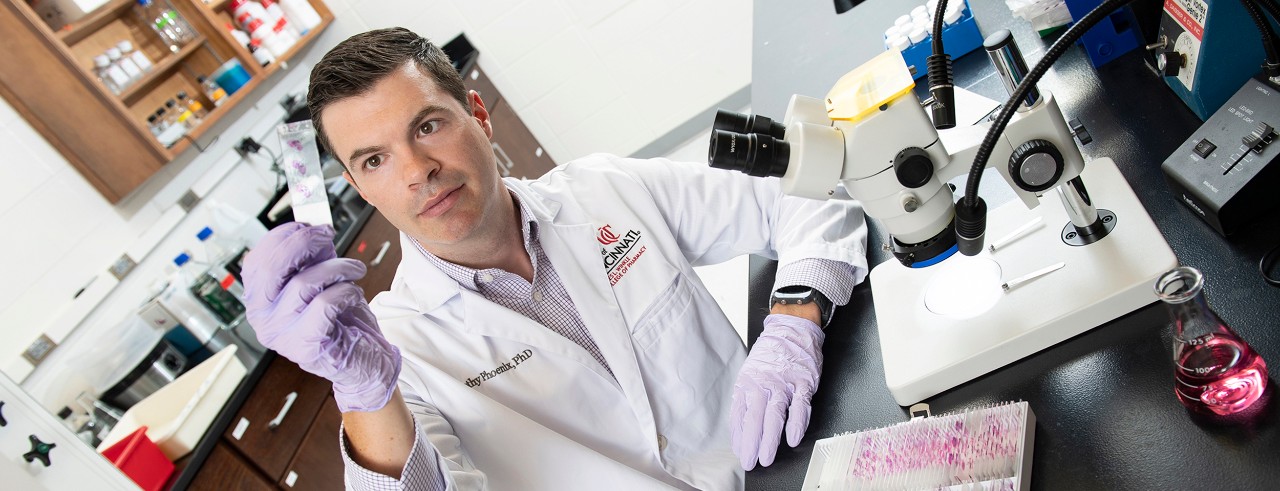
UC researchers received federal grant for pediatric brain tumor study
Researchers at the University of Cincinnati (UC) James L. Winkle College of Pharmacy and Cincinnati Children’s Hospital Medical Center have received a grant from the Department of Defense (DoD) to study pathways of drug delivery to pediatric brain tumors—specifically pediatric brain tumors known as Diffuse Intrinsic Pontine Glioma (DIPG).
According to the National Institutes of Health, DIPG typically affects children 4 to 9 years of age. Children progressively lose muscle control as the tumor grows diffusely in the pons, which is a region deep inside the brain that connects the brain to the spinal cord. Due to its delicate and difficult to reach location, surgical removal is not an option, and radiation alone remains the standard of care. Despite radiation treatment, children usually succumb to the disease within nine months, and less than 1 percent survive longer than five years.
Recent advances in defining the genetic landscape of these tumors provides new hope, but obstacles remain for therapies.
“The field has made significant progress over the past decade in understanding the genetics that drive brain tumor development and growth. This provides an exciting opportunity to attack these tumors with new targeted therapies, but unfortunately, the vast majority of these drugs do not penetrate into the brain,” says Timothy Phoenix, PhD, principal investigator on the three-year, $577,200 Career Development Grant.
At present, Phoenix says, toxic drugs often have to be given at very high doses in order to have any prospect of adequate amounts crossing the blood-brain barrier.
The study, titled “Defining and Targeting the Blood-Brain Barrier in Pediatric Glioma Subgroups,” will provide a basic understanding of tumor-blood vessel interactions, and identify potential differences between brain tumors that grow in different locations. In addition, Phoenix will examine if manipulating blood vessel Wnt signaling, a regulator of vascular permeability and drug penetration he identified prior to coming to UC, will improve drug penetration and response in a model of DIPG he has developed in the lab.
Increasing drug penetration into brain tumors is key to developing new, effective treatments and improving overall long-term survival, says Phoenix.
Phoenix was recruited to UC in 2017, with dual funding by Winkle College of Pharmacy and Cincinnati Children’s, and his work as a new faculty member is being mentored for this study by Nancy Ratner, PhD, a UC professor of pediatrics and program leader for the Cancer Biology and Neural Tumors program at the Cincinnati Children’s.
Figuring out how tumors interact with this natural blood-brain barrier will greatly inform choices of pharmacologics,” says Ratner, an expert in nervous system tumor biology and tumor genetics.
Cincinnati Children’s has ranked No.2 in the nation among Honor Roll hospitals in U.S.News & World Report's 2018-2019 Best Children’s Hospitals ranking, and No.1 in the cancer subspecialty.
Related Stories
UC Alumni Association names top alumni award winners
February 12, 2026
The University of Cincinnati Alumni Association has announced this year’s recipients of its highest honors for UC alumni. The 2026 honorees include: Vinod K. Dham, CEAS ’77; Thomas D. Cassady, A&S ’76, Hon ’19; Padma Chebrolu, CECH ’92; Ryan C. Marable, PharmD, Phar ’13. Each year, the UC Alumni Association (UCAA) honors a select few of its more than 360,000 alumni based on their career accomplishments and contributions to the university and community, recognizing them during Alumni Week festivities each spring.
UC’s research surges with $346M in awards
February 12, 2026
The University of Cincinnati reached $346 million in sponsored research awards in fiscal year 2025, up 6.6% increase over the previous year. Additionally, funding for clinical trials at UC climbed, with $88 million in industry-sponsored awards and $33 million in federally sponsored awards.
UC pharmacy alum teaches STEM to students
January 23, 2026
The Dayton Daily News highlighted the journey of University of Cincinnati James L. Winkle College of Pharmacy alumnus Doug Wurtzbacher, who now runs STEM after school programs and camps for students through his business iCode.
